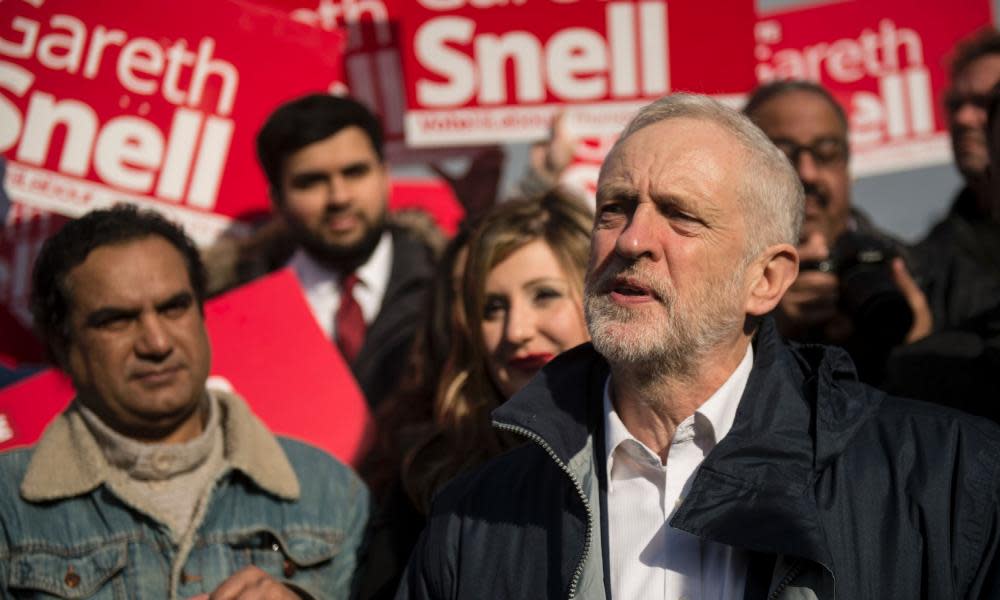MPs urge Jeremy Corbyn to table vote of no confidence in Theresa May

A group of Labour MPs is urging the party leader, Jeremy Corbyn, to table a vote of no confidence in the government immediately, to expose the lack of support in the House of Commons for Theresa May’s Brexit strategy.
Labour’s policy is to wait and see whether May secures a deal with Brussels and then vote against it. If she loses that vote, according to a motion passed at the party’s conference, “all options are on the table” – including a general election, or failing that, another referendum.
But some Labour MPs are sceptical about their party’s chances of securing a general election in those circumstances – and inclined to believe May’s insistence that, if her deal is rejected, Britain would be heading for a no-deal Brexit.
The Stoke-on-Trent Central MP, Gareth Snell, is among MPs who met in Westminster on Tuesday morning and agreed that if their party was serious about trying to force a general election to change the direction of Brexit, they should do so now. They claim to have the support of around 20 colleagues.
“There seems to be no majority in the house for what the government is proposing – so why waste any more time and risk a no-deal Brexit?” Snell told the Guardian.
“The Labour frontbench needs to put down a vote of no confidence ASAP to ensure we can put a deal to parliament that has majority support. If the PM survives that, then the Labour party knows that the chances of getting a general election are slim and that the supposed Tory rebels are more interested in their party’s fortunes than those of the country.”
If a motion of no confidence is passed, under the Fixed-term Parliaments Act there is a 14-day period in which party leaders can try and form a new government. If that does not succeed, a general election must be held.
With the DUP refusing to back the government in key votes because of its reservations about the Irish backstop, May faces the serious risk of being unable to get legislation – including the budget – through parliament.
Scepticism about May’s approach to the talks was evident on both sides of the House of Commons on Tuesday, after Dominic Raab returned from Brussels on Sunday empty-handed.
Asked by Tory MP Heidi Allen about whether MPs would be given a say before a no-deal Brexit, the prime minister said: “If, at the end of the negotiation process, both sides agreed that no deal was there, that would actually come back to this house, and then we would see what position the house would take in the circumstances of the time.”
Jeremy Corbyn told Labour MPs on Monday night that voting for Theresa May’s final agreement or risking a no-deal outcome was a “false choice”.
But Snell has commissioned analysis from the House of Commons library underlining the fact that while MPs would be given a vote before no deal took place, it would not amount to a veto.
After MPs amended the EU Withdrawal Act, May’s government would have to come back to the Commons with a statement, setting out “how it proposes to proceed”, if no deal is reached. The Commons would then be given a vote on a motion “in neutral terms”.
But the Commons library told Snell: “Even if the government statement does simply propose to accept and prepare for no deal, the mere fact that the Commons can vote on a ‘motion in neutral terms’ does not mean that voting down the motion can, legally and in isolation, prevent a no-deal Brexit.
“The way the Commons responds to the motion may have further political consequences, which may have a bearing on whether and/or when the UK leaves without a deal, but those are a matter for the government and parliament to resolve between them subsequently to any vote on a statement.”
Snell, who defeated the then-Ukip leader Paul Nuttall to win his Stoke-on-Trent seat, is among those Labour MPs who have expressed scepticism about the policy of seeking a second referendum. Some, including Caroline Flint and Lisa Nandy, have suggested they may be minded to back the prime minister’s deal.
Labour MPs in pro-leave constituencies are anxious about the idea that their voters would reject Labour if they believed the party was trying to overturn the result of the referendum.

 Yahoo News
Yahoo News 
